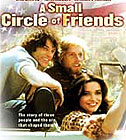|
|
|
|
A
Small Circle of Friends
|
 |
|
There is no use being generous towards a film like A Small Circle of Friends. If it presumes, as this one does, to speak of politics and political action, and if it attempts to define the relation between people's personal lives and their politics, then one must go straight to the point: what is the film's own politics? What attributes and positions does it espouse or reinforce? Look at this directly, A Small Circle of Friends is sometimes annoying, and most often out rightly offensive. The film bases itself upon the very worst – and most reactionary – aspects of humanist ideology. On the one hand, we are presented with great, noble Human Values – love and friendship. Fundamentally, these are seen as outside history and social influence. People may for a time get involved in political issues, but ultimately, Humanity is all that matters: the personal is not political. So, on the other hand, the dirty, suspicious domain of politics, where no human contact, no personal enrichment is possible. All this is announced right form the film's credits: the 'small circle' that resists the world and its ephemeral social transactions; the painting of the three heads, ennobled, outside time and history; the stirring orchestral music that speaks its message of personal growth and triumph. The film's narrative is structured on remembrance – two old friends who meet and recall the past through selective, significant flashbacks. The purpose of this structure – unhappily – is to evoke the image of two mature grown-ups reminiscing over their brash, preconscious, flirtation with politics in the late '60s and early '70s. Radical commitment thus gets reduced to the impulsive behaviour of childhood or adolescence. Take, for example, the scene in which Leo (Brad Davis, in a fine performance which is one of the film's few redeeming features) gains access to the Underground, a terrorist hideout. Everything – from Leo's remark "these people are crazy" to the visual details of the terrorist masked, separate, sullen, tinkering with bits and pieces – conspires to convey the message that these radical activists are immature kids stunted in their human development. But dangerous kids that play with bombs instead of toys – so clumsy that they end up destroying both themselves and their innocent guest Leo. The film is equally stupid in relation to feminism. Jessica (Karen Allen) joins the feminist movement after an argument with Leo. She is tired of being purely a sex-object, tired of having to carry the entire responsibility of contraceptive precaution. So far, so good. But, once a Feminist (stereotypically announced by short hair and jeans), she writes and performs in a play that re-enacts her bedroom relations with Leo for all to see; a vindictive, bitchy gesture. In fact, this is the only way the film can portray the feminist struggle – as anti-male aggression, petulant castration. Of course, as soon as Nicholas (Jameson Parker) tells her to grow up, she drops feminism and gets back to proper heterosexual relations. A Small Circle of Friends, even when it is attempting to be sincere and serious in relation to political issues is hopelessly glossy romanticised and evasive. In a memorable scene Jessica, Leo and Nicholas decided to do something radical – become a threesome. The spectator just has to take it on trust that they manage gloriously well, for the film briskly disposes of the problem of having to show just how two men who are not homosexual are able to share the same bed and the same women, and how they get rid of all their male, patriarchal conditioning. That all happens off-screen. The politics of the film are given away in its tell-tale ending. Earlier, the small circle was a threesome; once, Jessica painted an enormous mural accusing the apathy of middle-class America. But now, finally, the film is where it is most comfortable: with a beautiful, bourgeois, heterosexual, monogamous couple, destined for marriage despite the transparent disclaimer in the dialogue ("We'll see"), frozen into a graphic that, like the opening credit frees the film and its characters from any confrontation with history or politics. The circle is closed, once and for all. MORE Cohen: Daylight, The Fast and the Furious, xXx © Adrian Martin October 1980 |
![]()